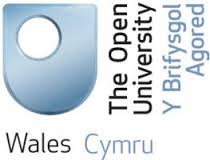The adapted text of a response to the award of an honorary doctorate by the Open University in a graduation ceremony held in the Wales Millennium Centre on 12 June 2015.
 Annwyl gyfeillion, rhaid imi ddweud ar y cychwyn ei bod hi’n anrhydedd anhygoel imi dderbyn y radd hon heddiw. I mi mae’r Brifysgol Agored yn dal i sefyll, ar ôl bron i hanner canrif, fel goleudy, yn fflachio ei olau ar draws y môr – sefydliad sy’n dangos y ffordd ymlaen o hyd i’r byd addysg.
Annwyl gyfeillion, rhaid imi ddweud ar y cychwyn ei bod hi’n anrhydedd anhygoel imi dderbyn y radd hon heddiw. I mi mae’r Brifysgol Agored yn dal i sefyll, ar ôl bron i hanner canrif, fel goleudy, yn fflachio ei olau ar draws y môr – sefydliad sy’n dangos y ffordd ymlaen o hyd i’r byd addysg.
I’d like to congratulate all of you who are graduating here. Unlike you, who’ve worked hard to arrive at today, I’m a fraud. I don’t have an Open University degree. I’ve never been an OU student. But my mum was. She was in her forties or fifties when she became an OU student, and she never forgot the value she gained from that experience. And I’ve been to several OU graduations. I love coming. Partly because it’s always a crazy and unsolemn occasion. But as well as that, you know for certain that no-one’s just drifted into the room after three years of occasional study and lots of rugby or rowing. Every Open University student has struggled hard and with determination to achieve their learning. Many of you have overcome all kinds of obstacles on the way.
The big word for the Open University, of course, is the word ‘Open’.
 The term ‘Open University’ was coined in 1962 by that ‘social visionary and innovator’ – that is what it says on his gravestone – Michael Young. Later on it started to be called by another name, ‘The University of the Air’, which made it sound like a training school for pilots. But Jenny Lee, the Minister in charge of making the OU a reality, hated that phrase. She thought it suggested ‘sitting in front of the telly’, and she stuck by Michael Young’s original word.
The term ‘Open University’ was coined in 1962 by that ‘social visionary and innovator’ – that is what it says on his gravestone – Michael Young. Later on it started to be called by another name, ‘The University of the Air’, which made it sound like a training school for pilots. But Jenny Lee, the Minister in charge of making the OU a reality, hated that phrase. She thought it suggested ‘sitting in front of the telly’, and she stuck by Michael Young’s original word.
‘Open’ referred to the new and flexible forms of learning the OU pioneered from the outset. But it also reflected, of course, the fundamental principle that you didn’t need any prior formal qualifications to enrol on an OU course.
 Some people were sceptical to start with – the Conservative politician Iain Macloed called it a ‘blithering nonsense’ – but the Open University survived and prospered. And openness is still at its heart. A great recent example is FutureLearn, the platform for free online courses the OU provides in collaboration with other institutions. There couldn’t be anything more open. Anyone with online access can use it free, anywhere in the world. FutureLearn has been a big success. One of its courses has recently attracted over 370,000 students.
Some people were sceptical to start with – the Conservative politician Iain Macloed called it a ‘blithering nonsense’ – but the Open University survived and prospered. And openness is still at its heart. A great recent example is FutureLearn, the platform for free online courses the OU provides in collaboration with other institutions. There couldn’t be anything more open. Anyone with online access can use it free, anywhere in the world. FutureLearn has been a big success. One of its courses has recently attracted over 370,000 students.
 I’ve spent my whole career in similar institutions to the Open University – libraries and other cultural and educational bodies, and now the Coleg Cymraeg Cenedlaethol. All of them have at their heart the idea of equality and ease of access. Librarians, it’s fair to say, tend to share a common value, that everyone has a right to gain knowledge without barriers. During my fifteen years at the National Library of Wales I had just one constant aim – to make it easier for everyone, no matter who they were or where they were, to benefit from the Library’s huge resources. We opened the Library’s building in Aberystwyth to public use in all sorts of new ways, and we made as much knowledge as we could available to everyone at no cost online.
I’ve spent my whole career in similar institutions to the Open University – libraries and other cultural and educational bodies, and now the Coleg Cymraeg Cenedlaethol. All of them have at their heart the idea of equality and ease of access. Librarians, it’s fair to say, tend to share a common value, that everyone has a right to gain knowledge without barriers. During my fifteen years at the National Library of Wales I had just one constant aim – to make it easier for everyone, no matter who they were or where they were, to benefit from the Library’s huge resources. We opened the Library’s building in Aberystwyth to public use in all sorts of new ways, and we made as much knowledge as we could available to everyone at no cost online.
 It made no sense to me to do what some of our sister institutions were doing, to put up pay and access barriers in the way of online knowledge. The whole point was not to discourage use by erecting obstacles. My personal model was Tim Berners-Lee, the inventor of the World Wide Web. Instead of making a fortune by patenting his invention, as he could so easily have done, he chose to make it available free to everyone. Through that single decision he revolutionised online communication and he benefitted the whole world.
It made no sense to me to do what some of our sister institutions were doing, to put up pay and access barriers in the way of online knowledge. The whole point was not to discourage use by erecting obstacles. My personal model was Tim Berners-Lee, the inventor of the World Wide Web. Instead of making a fortune by patenting his invention, as he could so easily have done, he chose to make it available free to everyone. Through that single decision he revolutionised online communication and he benefitted the whole world.
Open knowledge and open software have their counterparts in many other fields. In higher education, open access publishing aims to make sure that research results are available free to the public that funded the research. Open learning, like FutureLearn, makes learning easier for those who aren’t formally enrolled students. Open data – large-scale information collected by public bodies – are becoming more available for public use and reuse.
 There’s no more open institution, by the way, than the public library. A public library has no designs on those who choose to use it. It simply throws its doors open and offers the world of knowledge – and many other things – to anyone who cares to make use of them, for any purpose they wish. It’s a tragedy, in my view, that the whole system of public libraries in the UK is now under threat in the name of austerity. Libraries need defending by those who use them and care for them, and for the values that lie behind them.
There’s no more open institution, by the way, than the public library. A public library has no designs on those who choose to use it. It simply throws its doors open and offers the world of knowledge – and many other things – to anyone who cares to make use of them, for any purpose they wish. It’s a tragedy, in my view, that the whole system of public libraries in the UK is now under threat in the name of austerity. Libraries need defending by those who use them and care for them, and for the values that lie behind them.
What all these, and other, ‘open’ movements aim for is something essential that they share – open minds. Minds that are curious. Minds that question received opinion. Minds that don’t have their agendas decided for them by governments, or employers, or other authorities.
Open is even more important now that the UK is in danger of becoming the most unequal country in Europe, a society that sometimes seems to have forgotten that learning and knowledge are the birthright of every one of its members. Learning and knowledge are critical. And so are the skills and commitment of those who can inspire people to learn, to be curious. I’m sure that many of you who graduate today possess those skills and commitment. BA or BSc (Open) really does mean something, and I hope that you’ll all pronounce the word ‘Open’ in your new titles with pride and satisfaction.
Diolch yn fawr am wrando – a llongyfarchiadau mawr, unwaith eto, i bob un ohonoch chi sy’n graddio heddiw.

Leave a Reply